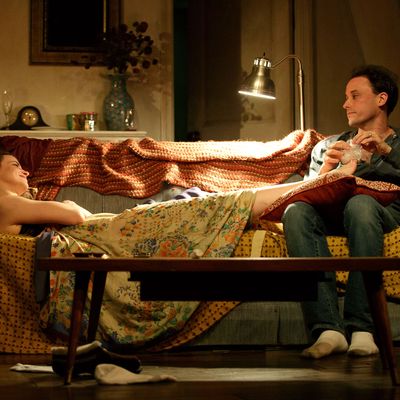
Before a single line is spoken, a hint of the horror to come announces itself in the expressionistic angles of the garret apartment and in the hollow poltergeist bang of the radiator. But it actually takes some 45 minutes before the big, menacing knife appears in Amy Herzog’s new psychological thriller Belleville. Meanwhile, with mild anxiety, we get to know Abby and Zack, a young married couple as mismatched as their initials, living at dire cross-purposes in the Paris neighborhood for which the play is named.
The playwright and her expert leads, Maria Dizzia and Greg Keller, are on promising ground here. Herzog’s previous plays, which include After the Revolution, 4,000 Miles, and The Great God Pan, all dance on the hot surface of the social skin, that thin but tough barrier between inside and outside realities. How truth is conveyed from one realm to the other, or gets stuck and disfigured in the process, is a theme of all those earlier works, and Belleville at first seems poised to take it on even more squarely. Where After the Revolution has a political framework, and The Great God Pan a question of buried child abuse, Belleville starts with no issue or even plot, just character. Forget the social skin; the play’s dramatic surface is partly sheared off. And soon its literal skin is, too: Abby tears a toenail, with grotesque consequences.
But then Abby is already in pain. (And is a pain.) We learn that she had a breakdown in college, suffers still over her mother’s death several years before the action, and is only now discontinuing the use of antidepressants and anti-anxiety pills. Her diagnosis would seem to be entitlement disorder, a failure to put her own rather ordinary sadness in proper proportion to the suffering of others. When she insults her husband, as she does with scary intensity and frequency, her apologies aren’t exactly soothing:
ZACK: I guess it doesn’t occur to you that it hurts like hell when you say shit like that.
ABBY: It does occur to me, and then I say it anyway. I’m sorry.
And Zack, who initially seems the more easygoing spouse, is also operating, we gradually understand, with his dials set wrong. (He’s a doctor at Médecins Sans Frontières, but he’s also a pothead, and why isn’t he sure of the difference between a vein and an artery?) The interplay of their two dysfunctions keeps things sparking long enough for Herzog to unleash fusillades of rich observation about the selfishness of a certain privileged (read: American) demographic. (Abby: “I’m allowed to say these things: you’re not.”) Lies, even momentous ones, are too easily absorbed into the dailiness of life. All cruelty is deliberate.
So for those first 45 minutes, Belleville offers an eye-opening tour through the amusing if potentially dangerous neighborhood of West Solipsism. But once that knife comes out – innocently enough at first, to slice a baguette – the mechanics of plot take over and the delicious specificity of the couple begins to feel like manipulation. What we thought was spontaneous dialogue is now revealed to have been clues. A different part of the brain is engaged, and different questions arise. It’s no longer “Why are sensitive people so tyrannical?” but “Why would Abby believe what even her landlords immediately discover to be false about Zack?”
There’s a logical answer, well set up and executed. But if Herzog coolly closes all the logical doors before we can escape, in doing so she concedes to an unlovely element of the genre. Psychological thrillers work by unbalancing the normal economy of audience identification. Usually the identification is diffuse: Think Chekhov. But in a psychological thriller, only one character shares the author’s full knowledge, and so the audience is forced into the position of the character who knows too little. The audience becomes passive – in fact, becomes the victim. Which is highly effective for manufacturing dread: During Belleville’s second half, you can do little but wring your hands, or as everyone in the theater seemed to be doing the night I saw it, a friend’s or spouse’s.
Fair enough; it’s a thrilling ride, thanks to a production that’s ruthlessly intelligent, from direction (by Anne Kauffman) to design (especially the noir soundscape by Robert Kaplowitz). And perhaps enhancing the audience’s interpersonal connections at the expense of the characters’ is a sufficient aim of theater. But to the extent that the play stakes a claim to larger significance, it can only do so by asking you to consider whether all Americans are nitwits and whether all social language masks sociopathic malice. Clearly, Herzog doesn’t believe this. In a smart and thoughtful touch, she provides a coda during which we may unclench our fists and (if we understand enough simple French) pick up the moral, delivered by the French-Senegalese landlord’s wife as she cleans up the white people’s mess. “C’est pas une catastrophe,” she says: It’s not a catastrophe. Which is a damning comment on the play’s self-involved characters, and perhaps on the deeper aspirations, if any, of the play itself.
Belleville is at New York Theatre Workshop through March 31. [Update, 3/4/2013: the show has been extended through April 14.]

